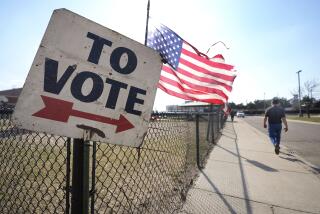Opinion: What does it mean to be a citizen? A dozen answers to a single question

Southern California residents answer the question of what it means to be a citizen.
Over the past few weeks The Times editorial board has been digging into what might seem like a simple question: What does it mean to be a U.S. citizen? It turns out, though, that the concept of citizenship encompasses some not-so-hidden complexities.
The United States, as we all know, was born of immigration, and many Americans talk proudly of when and how their ancestors arrived in the country. In fact, curiosity about family roots has helped make genealogy, by some accounts, the second-most popular hobby among Americans.
But we rarely talk about citizenship itself, its benefits as well as its responsibilities, and its evolution from the exclusionary beliefs of the Founding Fathers through the post-Civil War expansion of rights to the post-World War II Civil Rights battles as African Americans struggled (and in many ways continue to struggle) to exercise those rights of citizenship.
These days, our few discussions of citizenship tend to meld with the often vitriolic debate over illegal immigration, though to my mind our failure as an electorate poses a bigger problem than people living here without documents. Voter turnout this year was 36% of eligible voters, the lowest level since World War II, when the nation had other matters on its mind when it came time to vote in the 1942 midterm elections. And yes, choosing not to vote can be read as a political act, but it is an act of rejection, not engagement, and thus a failure of democracy.
But those come after the launch point: being a citizen in the first place. For our 21st Century Citizen series, we’ve been looking at such issues as birthright citizenship, why citizenship matters and, at the most fundamental level, the meaning of citizenship. The board argues that citizenship is more than a piece of paper or a passport. It is, in fact, “a source of empowerment and an investment in good government.”
Citizenship is the building block of a democracy, but that foundation is affected by individualized definitions, and individual answers to fundamental questions. Does being a citizen require, as a matter of responsibility though not law, that one must vote in every election? Must we engage in the civic community or can we go blithely on tending to our personal business without concerning ourselves with the health and well-being of our neighbors? Does being a citizen involve blind allegiance to the government and American society? Or is it the opposite, requiring that we engage in informed and vigorous questioning of what the government, and our society, do?
As I said, these broad questions have individual answers, though I suspect not enough of us ask ourselves and others these questions. But some people have. We put that core question — What does it mean to be a citizen? — to a range of Southern Californians. This is what they had to say:
This is part of an ongoing conversation exploring the meaning of citizenship in America today. For more, join us at latimes.com/citizenship and #21stCenturyCitizen. We’d love to hear from you. Share your thoughts, rebuttals and experiences with us at letters@latimes.com.
Follow Scott Martelle on Twitter @smartelle.
More to Read
A cure for the common opinion
Get thought-provoking perspectives with our weekly newsletter.
You may occasionally receive promotional content from the Los Angeles Times.







